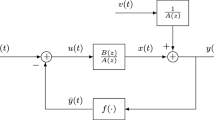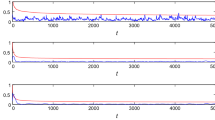Abstract
The identification problem of closed-loop or feedback nonlinear systems is a hot topic. Based on the hierarchical identification principle, this paper presents a hierarchical stochastic gradient algorithm and a hierarchical multi-innovation stochastic gradient algorithm for feedback nonlinear systems. The simulation results show that the hierarchical multi-innovation stochastic gradient can more effectively estimate the parameters of the feedback nonlinear systems than the hierarchical stochastic gradient algorithm.




Similar content being viewed by others
References
E.W. Bai, An optimal two-stage identification algorithm for Hammerstein–Wiener nonlinear systems. Automatica 34(3), 333–338 (1998)
E. Bai, Z. Cai, How nonlinear parametric Wiener system identification is under Gaussian inputs? IEEE Trans. Automat. Control 57(3), 738–742 (2012)
X. Cao, D.Q. Zhu, S.X. Yang, Multi-AUV target search based on bioinspired neurodynamics model in 3-D underwater environments. IEEE Trans. Neural Netw. Learn. Syst. (2016). doi:10.1109/TNNLS.2015.2482501
Z.Z. Chu, D.Q. Zhu, S.X. Yang, Observer-based adaptive neural network trajectory tracking control for remotely operated Vehicle. IEEE Trans. Neural Netw. Learn. Syst. (2016). doi:10.1109/TNNLS.2016.2544786
F. Ding, X.M. Liu, Y. Gu, An auxiliary model based least squares algorithm for a dual-rate state space system with time-delay using the data filtering. J. Franklin Inst. 353(2), 398–408 (2016)
F. Ding, X.M. Liu, M.M. Liu, The recursive least squares identification algorithm for a class of Wiener nonlinear systems. J. Franklin Inst. 353(7), 1518–1526 (2016)
F. Ding, X.M. Liu, X.Y. Ma, Kalman state filtering based least squares iterative parameter estimation for observer canonical state space systems using decomposition. J. Comput. Appl. Math. 301, 135–143 (2016)
F. Ding, X.H. Wang, Q.J. Chen, Y.S. Xiao, Recursive least squares parameter estimation for a class of output nonlinear systems based on the model decomposition. Circuits Syst. Signal Process. 35(9), 3323–3338 (2016)
L. Feng, M.H. Wu, Q.X. Li et al., Array factor forming for image reconstruction of one-dimensional nonuniform aperture synthesis radiometers. IEEE Geosci. Remote Sens. Lett. 13(2), 237–241 (2016)
P.P. Hu, F. Ding, Multistage least squares based iterative estimation for feedback nonlinear systems with moving average noises using the hierarchical identification principle. Nonlinear Dyn. 73(1–2), 583–592 (2013)
Y. Ji, X.M. Liu, Unified synchronization criteria for hybrid switching-impulsive dynamical networks. Circuits Syst. Signal Process. 34(5), 1499–1517 (2015)
Q.B. Jin, Z. Wang, X.P. Liu, Auxiliary model-based interval-varying multi-innovation least squares identification for multivariable OE-like systems with scarce measurements. J. Process Control 35(11), 154–168 (2015)
H. Li, Y. Gao, P. Shi, H.K. Lam, Observer-based fault detection for nonlinear systems with sensor fault and limited communication capacity. IEEE Trans. Automat. Control (2016). doi:10.1109/TAC.2015.2503566
H. Li, P. Shi, D. Yao, L. Wu, Observer-based adaptive sliding mode control for nonlinear Markovian jump systems. Automatica 64, 133–142 (2016)
H. Li, Y. Shi, W. Yan, On neighbor information utilization in distributed receding horizon control for consensus-seeking. IEEE Trans. Cybern. (2016). doi:10.1109/TCYB.2015.2459719
H. Li, Y. Shi, W. Yan, Distributed receding horizon control of constrained nonlinear vehicle formations with guaranteed \(\gamma \)-gain stability. Automatica 68, 148–154 (2016)
Y.W. Mao, F. Ding, Multi-innovation stochastic gradient identification for Hammerstein controlled autoregressive autoregressive systems based on the filtering technique. Nonlinear Dyn. 79(3), 1745–1755 (2015)
J. Pan, X.H. Yang, H.F. Cai, B.X. Mu, Image noise smoothing using a modified Kalman filter. Neurocomputing 173, 1625–1629 (2016)
R.Y. Ruan, C.L. Yang, H.X. Chen, B. Li, On-line order estimation and parameter identification for linear stochastic feedback control systems. Automatica 39(2), 243–253 (2003)
C. Sun, F.L. Wang, X.Q. He, Robust fault estimation for takagi-sugeno nonlinear systems with time-varying state delay. Circuits Syst. Signal Process. 34(2), 641–661 (2015)
J. van Wingerden, M. Verhaegen, Subspace identification of bilinear and LPV systems for open-and closed-loop data. Automatica 45(2), 372–381 (2009)
D.Q. Wang, Hierarchical parameter estimation for a class of MIMO Hammerstein systems based on the reframed models. Appl. Math. Lett. 57, 13–19 (2016)
D.Q. Wang, F. Ding, Parameter estimation algorithms for multivariable Hammerstein CARMA systems. Inf. Sci. 355–356(10), 237–248 (2016)
Y.J. Wang, F. Ding, Recursive least squares algorithm and gradient algorithm for Hammerstein–Wiener systems using the data filtering. Nonlinear Dyn. 84(2), 1045–1053 (2016)
X.H. Wang, F. Ding, Recursive parameter and state estimation for an input nonlinear state space system using the hierarchical identification principle. Signal Process. 117, 208–218 (2015)
Y.J. Wang, F. Ding, Recursive parameter estimation algorithms and convergence for a class of nonlinear systems with colored noise. Circuits Syst. Signal Process. 35(10), 3461–3481 (2016)
Y.J. Wang, F. Ding, Novel data filtering based parameter identification for multiple-input multiple-output systems using the auxiliary model. Automatica 71, 308–313 (2016)
Y.J. Wang, F. Ding, The filtering based iterative identification for multivariable systems. IET Control Theory Appl. 10(8), 894–902 (2016)
Y.J. Wang, F. Ding, The auxiliary model based hierarchical gradient algorithms and convergence analysis using the filtering technique. Signal Process. 128, 212–221 (2016)
T.Z. Wang, J. Qi, H. Xu et al., Fault diagnosis method based on FFT-RPCA-SVM for cascaded-multilevel inverter. ISA Trans. 60, 156–163 (2016)
J. Wang, A. Sano, D. Shook, T. Chen, B. Huang, A blind approach to closed-loop identification of Hammerstein systems. Int. J. Control 80(2), 302–313 (2007)
C. Wang, T. Tang, Several gradient-based iterative estimation algorithms for a class of nonlinear systems using the filtering technique. Nonlinear Dyn. 77(3), 769–780 (2014)
T.Z. Wang, H. Wu, M.Q. Ni et al., An adaptive confidence limit for periodic non-steady conditions fault detection. Mech. Syst. Signal Process. 72–73, 328–345 (2016)
D.Q. Wang, W. Zhang, Improved least squares identification algorithm for multivariable Hammerstein systems. J. Franklin Inst. 352(11), 5292–5307 (2015)
C. Wang, L. Zhu, Parameter identification of a class of nonlinear systems based on the multi-innovation identification theory. J. Franklin Inst. 352(10), 4624–4637 (2015)
X.K. Wei, M. Verhaegen, T. van Engelen, Sensor fault detection and isolation for wind turbines based on subspace identification and Kalman filter techniques. Int. J. Adapt. Control Signal Process. 24(8), 687–707 (2010)
D.H. Wu, Y.Y. Li, Fault diagnosis of variable pitch for wind turbines based on the multi-innovation forgetting gradient identification algorithm. Nonlinear Dyn. 79(3), 2069–2077 (2014)
L. Xu, The damping iterative parameter identification method for dynamical systems based on the sine signal measurement. Signal Process. 120, 660–667 (2016)
L. Xu, Application of the Newton iteration algorithm to the parameter estimation for dynamical systems. J. Comput. Appl. Math. 288, 33–43 (2015)
L. Xu, A proportional differential control method for a time-delay system using the Taylor expansion approximation. Appl. Math. Comput. 236, 391–399 (2014)
L. Xu, L. Chen, W.L. Xiong, Parameter estimation and controller design for dynamic systems from the step responses based on the Newton iteration. Nonlinear Dyn. 79(3), 2155–2163 (2015)
L. Xu, F. Ding, Recursive least squares and multi-innovation stochastic gradient parameter estimation methods for signal modeling. Circuits Syst. Signal Process (2017). doi:10.1007/s00034-016-0378-4
G. Zhang, X. Zhang, H. Pang, Multi-innovation auto-constructed least squares identification for 4 DOF ship manoeuvring modelling with full-scale trial data. ISA Trans. 58, 186–195 (2015)
Acknowledgments
This work was supported by the National Natural Science Foundation of China (No. 61273194) and the 111 Project (B12018).
Author information
Authors and Affiliations
Corresponding author
Rights and permissions
About this article
Cite this article
Shen, B., Ding, F., Alsaedi, A. et al. Gradient-Based Recursive Identification Methods for Input Nonlinear Equation Error Closed-Loop Systems. Circuits Syst Signal Process 36, 2166–2183 (2017). https://doi.org/10.1007/s00034-016-0394-4
Received:
Revised:
Accepted:
Published:
Issue Date:
DOI: https://doi.org/10.1007/s00034-016-0394-4




